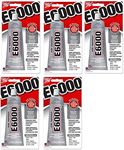Buying Guide for the Best Glass Glues
Choosing the right glass glue is important to ensure a strong, clear, and lasting bond for your glass projects. Whether you’re repairing a broken vase, assembling a glass craft, or fixing a window, understanding the key features of glass glues will help you make the best choice for your needs. The right glue will not only hold the glass together but also maintain its appearance and durability over time.Adhesive TypeThe adhesive type refers to the chemical composition of the glue, such as epoxy, silicone, or cyanoacrylate (super glue). This is important because different types offer varying strengths, drying times, and levels of flexibility. Epoxy glues are known for their strong, durable bonds and are good for heavy-duty repairs, while silicone adhesives are flexible and waterproof, making them suitable for aquariums or outdoor use. Cyanoacrylate glues dry quickly and are best for small, quick fixes. To choose the right type, consider what you are gluing, whether you need flexibility or rigidity, and if the bond will be exposed to water or temperature changes.
Drying TimeDrying time is how long it takes for the glue to set and reach its full strength. This matters because some projects need a quick fix, while others can wait for a stronger, longer cure. Fast-drying glues are convenient for small repairs but may not be as strong as those that take longer to cure. Longer drying times usually mean a stronger, more durable bond. If you need to use or move the item soon after gluing, pick a fast-drying option. For important or load-bearing repairs, be patient and choose a glue with a longer curing time.
TransparencyTransparency refers to how clear the glue dries once it has set. This is crucial for glass because you usually want the repair to be as invisible as possible. Some glues dry completely clear, while others may leave a cloudy or yellowish tint. If appearance is important, such as for decorative items or visible repairs, always choose a glue that promises a clear, non-yellowing finish. For hidden or functional repairs, this may be less important.
Water and Heat ResistanceWater and heat resistance describe how well the glue holds up when exposed to moisture or high temperatures. This is important if the glass item will be used outdoors, in kitchens, bathrooms, or aquariums. Some glues are specifically designed to resist water and heat, while others may weaken or break down. If your project will be exposed to these conditions, make sure to select a glue that is labeled as water- and heat-resistant.
Ease of ApplicationEase of application refers to how simple it is to use the glue, including the packaging, nozzle design, and whether mixing is required. Some glues come in easy-to-use tubes with precision tips, while others may require mixing two components. If you are new to using adhesives or need to make a precise repair, look for a glue that is easy to apply and control. For larger or more complex projects, you may be comfortable with a glue that requires mixing.
Bond StrengthBond strength is a measure of how much weight or force the glue can hold once it has cured. This is important for repairs that need to support weight or withstand stress. Glues with higher bond strength are better for structural repairs, while lower strength may be fine for decorative or light-duty fixes. Think about how much stress the glued area will experience and choose a glue with a suitable strength rating.















